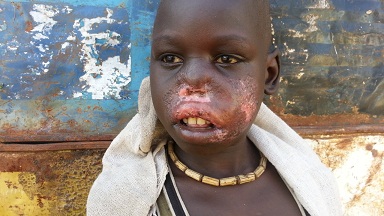
Leprosy a creation of God has affected humanity for over 4,000 years!
LEPROSY is a bacterial disease that destroys the peripheral and motor nerves. If left untreated, it can lead to a painful inflammation of the kidneys, the anaesthetising of extremities, deformity, and incurable blindness. Physical injury and impairment of circulation results in muscular atrophy, absorption of cartilage, eroding ulcers, monstrous chronic infections, and their accompanying fevers.

Rot, very literally, sets in.
RELATED PETITION TO END LEPROSY
It is easy to forget that leprosy as an active disease is a reality for millions of people in the world today because it vanished from Britain in 1798, although the last leprosy wing in a Norwegian health institute was not closed until the 1970s. And yet, with still no vaccine, one person is officially diagnosed with leprosy every fifty seconds, making some 2,000 new cases every day, and some 600,000 every year.
 |
| Only an evil god would allow this! |
The World Health Organisation estimates that, between 2010 and 2020, a further 7.5 million people will be infected.
 |
| Still think God is love? FUCK YOU! |
Leprosy remains most prominent in areas of poor hygiene, overcrowding, and poor nutrition, in populations whose immune systems have been significantly weakened.
 |
| Red or yellow, black or white they are precious in his sight. Jesus loves the little children of the world. FUCK YOU JESUS! |
70% of today's new cases are on the Indian subcontinent. Brazil comes next with just 6%, followed by Nepal and Indonesia at 2%. It is calculated that at least some 2.5 million people affected by leprosy still await the most basic medical care in India.
| What else would you expect from a god who would kill his own son? |
Leprosy still disables 100 times more people each year than polio in India, where the Leprosy Mission estimates that some 1,100,000 people are presently disabled by leprosy.
However, leprosy is not hereditary and is the least contagious of all communicable diseases. It is in fact easily treatable, if not curable with multi-drug therapy. Indeed, with a single dose, the patient immediately becomes non-infectious and is normally cured within 6 to 12 months.
The greatest problem for those diagnosed with leprosy is the total social ostracisation they suffer. This, in turn, leads to extreme poverty and interminable hardship. Driven from their homes, off their land and out of their communities, they are never able to return, even after the disease is 'burnt out'. Such stigma prevents many sufferers coming forwards for diagnosis or treatment, hence the enduring prevalence of the disease, despite international efforts to eradicate it.
 |
| Less than one-tenth of one percent of the Christian church's obscene wealth could end this God-inflected suffering. |
The focus of the leprosy projects of Sarvashubhamkara is primarily towards these people who have been cured of the disease and their stigmatised families on the Indian subcontinent. Largely abandoned by both state care and medical charities upon their official cure, these lonely, physically damaged people remain wholly rejected by all members of society.
People who bear the stigma of the disease are invariably reduced to living in isolated communities, within the poorest slums and often with no means of survival, except by begging. In addition, in India, the children of parents who have suffered from leprosy, even when they themselves are in perfect health, are commonly denied access to state education.
It is thus that those affected by leprosy are principle recipients of both Sarva's Education and Welfare projects. The charity's aim is to restore the self-confidence, dignity and some level of sustainable self-sufficiency for individuals and communities alike, primarily by setting up and supporting them in their own continuing medical care; and by providing educational opportunities, in addition to the human contact and compassionate attention they sorely lack. We thank you for your interest.
